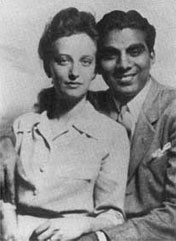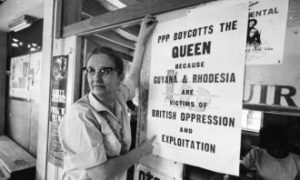As we celebrate Guyana’s 52nd Independence Anniversary, let us reflect on how the journey began.

Certainly the seeds of seeking an end to colonialism must have been planted in the hard days of slavery and indentureship when life was unbelievably difficult and the reason for the crushing oppression and cruelty was easy to define.
Billions of words have been written about slavery, the middle passage, the unbearable cruelty of the slave masters and the many uprisings against slavery. These were dealt with in ways which are almost beyond belief. Cheddi Jagan in his book “The West on Trial” writes about the prisoners in the Berbice uprising: “…53 of the defendants were condemned to death. Next day, 15 of them were burnt to death over a slow fire and 16 were broken on the rob rock. The remaining 22 persons were hanged…”
After slavery was abolished, indentured labourers for the many sugar estates were brought to this country. Their conditions were slightly better than the slaves. Dr. Jagan in his book quotes Elizabeth Caesar, a labourer of Pln. Vreed-en-Hoop: “…the Coolies were locked up in the sick house and next morning they were flogged with a cat-o’-nine tails; the manager was in the house, and they flogged the people under his house; they were tied to the post of the gallery… I cannot tell how many licks; he gave them enough. I saw blood. When they were flogged at the manager’s house they rubbed salt pickle on their backs.”
With these experiences and much more, the spirit of resistance against those who caused the sufferings was inlaid and would later be expressed in a desire ‘to be free of such exploitation.

Guyana’s history shows that the very beginning of the recognition of the need to be independent of Britain began with the formation of the People’s Progressive Party (PPP) in 1950. The ‘concept of a struggle to free British Guiana of colonialism probably had its origin in Cheddi Jagan’s studies, while a student in the USA, of the writings of Jawaharlal Nehru and Mahatma Gandhi. At that time, India was on a course aimed at complete independence from British rule. The struggle inspired many in the British, Dutch, French and Belgium colonies in all parts of the world to follow suit.
As early as 1945 Cheddi Jagan, in an article wrote: “It therefore behoves the working class people to get control of government through their Constitutional ballots in our forthcoming election, with a view towards complete independence.”
And after the PPP was founded, in its first Manifesto, the Party declared: “The People’s Progressive Party recognising that the final abolition of exploitation and oppression, of economic crises and unemployment and wars will only be achieved by the socialist reorganisation of society, pledges itself to the task of winning a free and independent Guianese society in which security, plenty, peace and freedom shall be the heritage of all.”
Thus began the struggle in the then British Guiana for independence. Somewhere in the psyche of the onetime slaves and indentured workers lay the elements of resistance to those who brought about the misery of their forefathers. It took time for most Guyanese to accept the idea that Guyana could be a free and independent nation.
Many scoffed at the advocacy, by the PPP, of independence from Britain. British Guiana is too small to be independent they said. There was talk of an amalgamation of the three Guianas – British, Dutch and French – into one country.
Conservatives and recipients of favoured positions from the British, the business and religious community (Christian), were against such an “outrageous” idea. There was, indeed, a lot of opposition to the concept of independence. The PPP pursued its objective through the years. Former allies fell out and I can recall, would only support independence if Jagan were not at the head of government. The Cold War, too, had its negative effects which led to political interference and a nation in dire conflict.
Despite the long and difficult struggle for independence, which many countries also experienced, Guyana became a free and independent nation and proudly took its place in the United Nations and other organisations, like the Non-Aligned Movement, the OAS, etc.
All Guyanese can be proud that we have overcome oppression, exploitation and attempts at a dictatorship. Guyana is a democracy that upholds all the finest principles of a democratic state. We have our problems, serious problems, but they will be overcome. Unity is the password to our future. (Excerpts from An article written by the late and former President Janet Jagan ) (Guyana Times Sunday Magazine)



